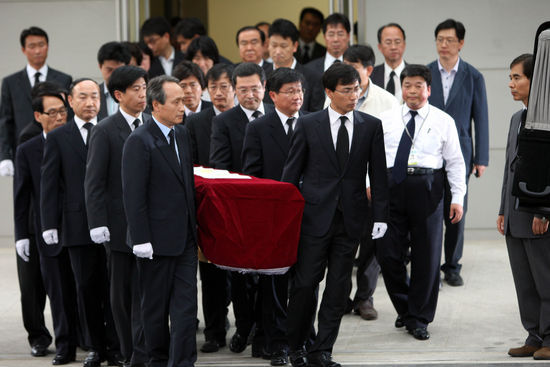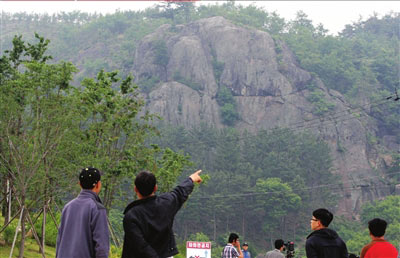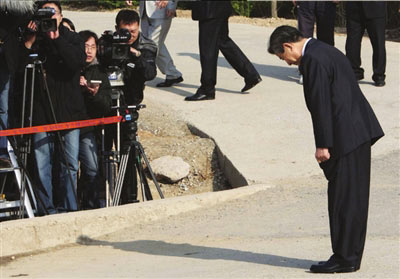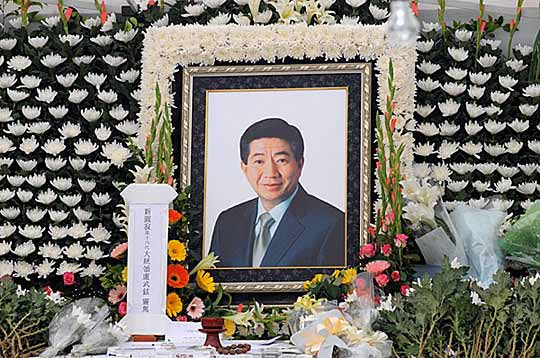(单词翻译:单击)
逝世报道
Former S. Korean President Roh dies in apparent suicide
Former South Korean President Roh Moo-hyun has died while hiking in mountains near his home. His death has shocked the country. Local media are speculating that this could be a suicide, as Roh Moo-hyun was involved in a corruption scandal.
The 62-year-old Roh fell to his death just 200 meters from his home. A body guard was with him.
His former aide says Roh appeared to act deliberately.

Moon Jae-In, Roh Moo-Hyun's Lawyer & Former Aide, said, "Former President Roh left his house at 5:45 a.m.. While hiking on the mountain, he appears to have jumped off a rock at around 6:40 a.m."
Roh was taken to a hospital in the nearby port city of Busan where he soon died from head injuries.
Paek Seung-Wan, Chief Busan Nat'l University Hospital, said, "Doctors in this hospital attempted CPR but suspended it at 8:30 am as he failed to recover."
Local media reports are calling it suicide.
Roh's former aide also confirmed Roh left a note for his family.
In the note Roh said life was "difficult" and apologized for making "too many people suffer".
His death has shocked South Koreans, including the current President Lee Myung-bak.
(GRAPHICS)
Roh's note to his family:
I have made too many people suffer.
Due to poor health, I can't read books, nor can I write.
Don't be too sad. Don't blame anybody.
Please cremate me. Please leave a small tombstone near home.
Lee Dong-Kwan, Spokesman, South Korean Presidential Office, said, "President Lee Myung-bak says it is truly unbelievable. He says it is a regretful and tragic matter, and has expressed his condolences."
The public are also grieving.
Park Kyung-Hee, Resident, said, "I am extremely sad. I can't imagine how much pain he had to suffer. I think that death was the best choice for him so that those close to him would not have to suffer."
Song Hyun-Sook, Resident, said, "It is very horrible that he died. I do not want to believe it. He is not going to come back alive, I am heartbroken."
Roh was under heavy pressure in recent weeks.
He and his family were under investigation in connection with a bribery scandal. The ex-president was struggling to clear his name.
The Justice Minister says the investigation on Roh and his family will be put to an end.
自杀认定
Police: Roh′s death appears to be suicide
Police in South Korea say Roh Moo-hyun's death is apparently a suicide.
Police officers say the former president hurled himself off a steep cliff early on Saturday while hiking near his home in Bongha.
Police say a security guard was accompanied Roh during the hiking trip in the mountains. The guard told police that before jumping from the cliff, the former president deliberately caused the guard to turn his attention away to some other climbers on the mountain.

After the fall, Roh was rushed to a local hospital. Later he was transferred to Busan National University Hospital, where he was declared dead, several hours later.
Paek Seung-Wan, Chief Busan National University Hospital, said, "When he came into hospital, the electrocardiogram monitoring showed no sign of pulse beat. A laceration measuring 11 centimeters was found on the front part of his head. Doctors in this hospital attempted cardiopulmonary resuscitation (CPR) but suspended it at 8:30 am since he failed to recover."
生平简介

卢武铉生于1946年8月6日,韩国庆尚南道金海市进永邑人。夫人权良淑,育有一子一女。
他在2002年12月19日的选举中击败韩国国家党的李会昌,并于2003年2月25日就任韩国第16任总统。
座右铭:“严于律己,宽以待人”
著作:《卢武铉见到的林肯》和《卢武铉谈领导才干》等。
Roh Moo-hyun (6 August 1946 – 23 May 2009) was the 16th President of South Korea. He held the position from 25 February 2003 to 25 February 2008. Before entering politics, he was a human rights lawyer.
Roh's pre-presidential political career focused on human rights advocacy for student activists in South Korea. His electoral career later expanded to a focus on overcoming regionalism in South Korean politics, culminating in his election to the presidency. The election was strongly influenced by activists on the Internet, and particularly via OhmyNews—the first time this had ever happened in Korea.
Roh's election was notable for the arrival to power of a new generation in Korean politics, the so-called 386 Generation, (i.e. people in their thirties when the word was coined, who had attended university in the 1980s, and who were born in the 1960s). This generation had been veterans of student protests against authoritarian rule, and advocated an assertively nationalist line towards the United States and Japan, and a conciliatory approach towards North Korea. They took up many positions on Roh's staff.
Despite high initial hopes, however, Roh's administration quickly became dogged by allegations of incompetence, while Roh's frequent indulgence in personal clashes with his opponents and critics erode public support. Conflict would continue throughout his presidency, which was characterized by continual labor unrest, personal feuds with the media, and diplomatic friction with the United States and Japan. Many of Roh's seemingly reckless political campaigns, including a plan to move the capital, and a plan to form a coalition with the opposition, also fizzle.
One year and two months after leaving office, Roh became the center of an ongoing bribery scandal. This scandal, the collapse of the "Pro-Roh faction" of politicians, the collapse of the Uri Party and the defeat of its successor Democratic Party in the National Assembly, and the defeat of Roh's designated successor in the presidential elections, marked a decline in the fortunes of the 386 Generation that had brought Roh to power.
Roh committed suicide on 23 May 2009 by jumping from a mountain cliff, after leaving a suicide note. His suicide was confirmed by the police.
个人简历
1966年,毕业于韩国釜山商业高等学校;
1975年,靠自学通过司法考试;
1977年,任大田市地方法院法官;
1978年,开办律师事务所;
1985年,发起成立“釜山民主市民协议会”并担任常任委员;
1988年,当选第13届国会议员(民主党籍);
1990年起,任民主党企划调整室长、发言人、青年特别委员会委员长、最高委员、副总裁;
1993年,任民主党最高委员;
1997年11月,任政治国民会议副总裁
1998年,当选第15届国会议员;
2000年,任韩国海洋水产部长官;
2001年9月,、宣布参加韩国总统竞;
2001年10月,任新千年民主党常任顾问、最高委员;
2002年7月,成为新千年民主党总统候选人;
2002年12月,当选韩国第16届总统;
2003年2月25日,正式出任韩国总统;
2004年3月12日,韩国国会以法定的三分之二以上的绝对多数票通过了弹劾动议案,卢武铉即被中止总统权力,由国务总理代行总统权力;
2004年5月14日,韩国宪法法院对弹劾案做出判决,宣布驳回国会提出的总统弹劾案,卢武铉将立即恢复行使总统权力;
2007年2月28日,递交退党申请,正式退出开放国民党;
2008年2月25日,正式卸任韩国总统;
2009年4月初,卢武铉承认妻子权良淑2007年收受朴渊次100万美元。卢武铉的侄女婿延哲浩也承认从朴渊次处收受500万美元;
2009年4月30日,以嫌疑人身份前往最高检察机关大检察厅,就所涉受贿案件接受检方问询。成为继卢泰愚、全斗焕之后,第三位受到检方调查的韩国前总统。
传奇的一生
Roh Moo-Hyun backgrounder: Extraordinary life and death
From the son of a poor farming family to the president of South Korea, Roh Moo-Hyun's extraordinary life AND extraordinary death have shocked South Korea and beyond.
Just last month, state prosecutors questioned Roh Moo-hyun for 13 hours on his involvement in the 6 million dollar corruption case. The accusations had deeply shamed him.

"I have no face to show to the people. I am sorry for disappointing you,"
Said an emotional Roh on April 30, days before the questioning.
Roh acknowledged that his wife took 1 million US dollars from Park Yeon-cha, head of a local shoe manufacturer, but insisted it was not a bribe. He also said he was aware that Park gave another 5 million dollars to a relative but said he thought it was an investment, and none of the money had anything to do with himself. But prosecutors say Roh was the ultimate target.
The former president came from humble beginnings.
Roh Moo-Hyun was born into a poor farming family and never went to college. He studied law on his own and passed South Korea's bar exam.
He rose to the presidency after a surprise 2002 election win on a campaign pledge not to "kowtow" to the United States. The pledge resonated with young voters.
He maintained predecessor's "sunshine policy" with the DPRK and met with its leader Kim Jong Il in Pyongyang in 2007.
And once out of power, Roh also fell from grace.
Prosecutors went after him on one graft charge after another. He once said his life in retirement had been disturbed and his home had virtually become a prison.
领导人慰问
China expresses condolences over Roh Moo-hyun´s death
Chinese Foreign Ministry spokesman, Ma Zhaoxu, has expressed condolences on the death of former South Korean President Roh Moo-hyun.

Ma says the former leader paid great attention to China-South Korea relations during his term of presidency. And the Chinese government and people will always remember Roh's contributions to boosting development of ties between the two countries.
遗书全文

とても多くの人々に面倒をかけた。私のせいで人々が受けた苦痛はあまりに大きく、今後受けるであろう苦しみもはかりしれない。余生も、他人に負担をかけざるを得ない。体調が悪く、何もできない。本を読むことも、ものを書くこともできない。
受惠于很多人,却让很多人因我而受难,往后将还有承受不完的痛苦。剩下的余生只会是别人的累赘。健康不很好,所以什么也不能做,就连书也读不下去,字也写不成。
"I am in debt to too many people, Too many people have suffered because of me. And I cannot imagine the suffering they will go through in the future." Due to my frail health, I cannot do anything.I can't even read a book or write anything."
あまり悲しまないでほしい。生と死はどちらも自然の一端ではないか。気の毒だと思わないでほしい。誰も恨まないでほしい。運命だ。
不要太过于悲伤,生和死不都是自然的一个形象?不要道歉,也不要埋怨谁,都是命。
"Don't be too sad. Aren't life and death both a piece of nature? Don't be sorry. Don't blame anyone. It is fate"
火葬してほしい。そして家の近くに、とても小さな碑をひとつだけ残してほしい。ずっと考えてきたことだ。
火葬了吧。然后在家附近的地方立个碑就足够了。这是酝酿了很久的想法。
"I just ask that my body to be cremated and for a small headstone to be left near my house."It's what I have thought about for a long time,"
노 전 대통령은 또 “아들, 딸과 지지자들에게도 정말 미안하다. 퇴임 후 농촌 마을에 돌아와 여생을 보내려고 했는데 잘 되지 않아 참으로 유감이다"면서 "돈 문제에 대한 비판이 나오지만 이 부분은 깨끗했다. 나에 대한 평가는 멋 훗날 역사가 밝혀줄 것이다”라고 적은 것으로 알려졌다.
卢武铉还在遗书中写道:“真的很对不起我的儿子、女儿还有所有支持我的人。本想退任后在乡村度过余生,没想到不能如愿,真是遗憾。虽然在金钱这方面,出现了很多批评我的声音,但我可以说是清清白白的。在遥远的未来,历史会给我一个公正的评价。”


